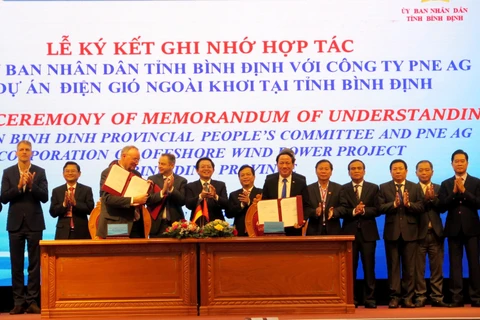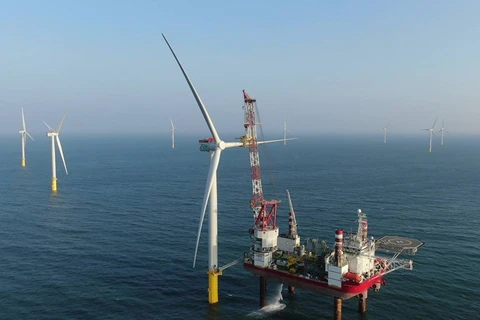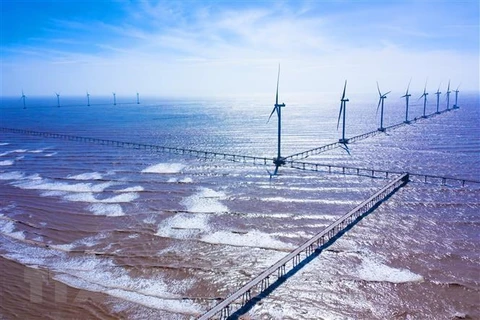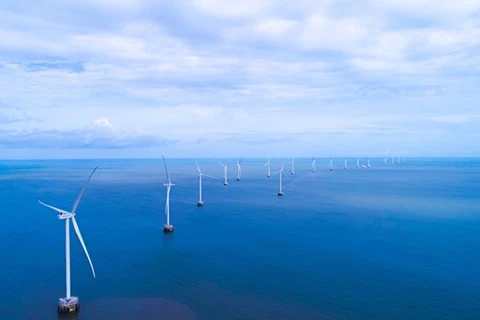Hanoi (VNA) – Accelerating energy transition and development of offshore wind energy will be an opportunity for Vietnam to move towards green growth, contributing to realising the country’s strong commitment to achieving net zero emissions by 2050, said international experts.
The opinion was shared by participants at a workshop discussing the potential for developing offshore wind power and marine spatial planning in Vietnam towards the blue economy held by the Norwegian Embassy in Vietnam and the UN Development Programme (UNDP) in collaboration with the National Assembly's Committee for Science, Technology and Environment, in Hanoi on April 20.
Potential for promoting offshore wind-power development
Dr. Ta Dinh Thi, Deputy Director of the NA’s Committee for Science, Technology and Environment said Vietnam boasts huge potential for offshore wind power development, especially south-central coastal localities such as Binh Thuan, Ninh Thuan, Khanh Hoa, Phu Yen and Binh Dinh.
Developing renewable energy is a major policy of the Party and the State, in which offshore wind power is considered one of the breakthrough solutions to promote energy transformation and ensure national energy security, he said.
This is closely related to marine spatial planning, especially identifying potential water areas and reasonable zoning for offshore wind power development, he added.
As one of the six countries in the world most affected by climate change, Vietnam is a pioneer in implementing 'green' commitments, he said.
Vietnam was committed to cutting emissions to net zero by 2050 at the 26th UN Climate Change Conference (COP26) in the UK in 2021. The country pledged to implement strong measures to reduce greenhouse gas emissions with its own resources, while calling for cooperation and support from the international community to realise the goal.
On the basis of Vietnam’s commitments, the Vietnamese government and international partners officially adopted a political declaration on establishing the Just Energy Transition Partnerships (JETP).
Thi stressed that to realise net zero emissions by 2050, Vietnam needs to speed up the development of renewable energy, improve energy efficiency and focus on energy transition with an appropriate roadmap, while ensuring objectives of environmental protection and response to climate change.
For areas being planned for developing offshore wind power, in-depth studies are required, in order to make specific recommendations, Thi noted.
Improving incomes, cutting emissions to net zero
Ramla Khalidi, UNDP Resident Representative in Vietnam, said that accelerating marine spatial planning is essential to unlocking the great potential of offshore wind power development in Vietnam, contributing to implementing sustainable development goals and climate change response goals, including cutting emissions to net zero by 2050.
Marine spatial planning should be seen as a continuous process, she noted, adding that Vietnam needs to ensure that the designation of areas for offshore wind power development is done transparently.
The participation of all stakeholders in the scheme, especially the local community, plays an important role in ensuring that benefits are shared equitably and vulnerable groups are protected, she said.
Sharing Khalidi’s opinion, Norwegian Ambassador to Vietnam Hilde Solbakken affirmed that her country is committed to working with partners in Vietnam to promote sustainable green growth, protect the marine environment and support energy transition in Vietnam.
According to the diplomat, Vietnam's marine spatial planning contributes to not only exploring sustainably offshore wind energy resources but also protecting marine resources, and also helps Vietnam attract foreign investment in developing sustainable "blue sea" economy.
More importantly, exploiting the potential for developing offshore wind power through sustainable marine spatial planning will help Vietnam realise its goals of improving incomes and cutting greenhouse emissions to net zero by 2050, Solbakken said.
She stressed that marine spatial planning will help the ocean to be managed sustainably, and play an important role in realising a shared vision of a green, sustainable and prosperous future, which will ensure that all industries will benefit from the ocean while marine ecosystems and biodiversity are still conserved./.



























